- Home
- Harper Lin
Granny Goes Hollywood Page 6
Granny Goes Hollywood Read online
Page 6
I had been instructed to go to a certain part of the set that was called the “Extras Corral”, a rather demeaning name for a large open area where the extras are supposed to gather before being herded to their next scene. Harvey had told me I was going to be in some group shots of the townspeople.
Parking was a nightmare, and I had to leave my car two blocks away (extras didn’t get reserved parking), and walk. Parking at a strip mall dressed as an old widow from the American Revolution was a new thing for me, but no one batted an eyelid. That sort of thing had become a common sight in Cheerville already.
When I got to the Extras Corral and looked at the cattle—I mean, extras—I had the shock of my life.
My son Frederick and my grandson Martin were there, dressed in 18th century clothing.
“What are you doing here?” we asked in unison. Given our costumes the answer was obvious. It was sort of like asking “Are you okay?” to someone who has just fallen down the stairs. Ridiculous, but what else do can say?
“We’ve been hired as extras,” my son grinned. “And you did too?”
I nodded.
“We’re going to be in a Cliff Armstrong movie! This is the best summer vacation ever!” Martin shouted, jumping up and down. He was thirteen, and tried to act the part of a cool teenager most of time, but the child he still half was came out when he got excited.
I smiled at him and tried to hide my worry. This set had become a warzone, and now two of my favorite people in the world were going to be hanging out here?
“What about Alicia?” I asked after my daughter-in-law.
Martin made a face. “Mom says she’s too busy. She’s got some boring meeting in the city tomorrow.”
Alicia is a leading scientist and one of the most driven people I have ever met. I had always worried that her overworking would be bad for her health. Now it might actually save her life.
On the far side of the lot, an older man stepped onto a platform and addressed us through a megaphone.
“Okay, everyone to the front of the church. We’re filming the final scene, the wedding shot where General Slaughter and Liberty Smith come out of the church and the townspeople cheer. Old Widow Goode, wherever you are, get over here. You’re standing right next to the stairs with the Minutemen.”
“That would be me,” I told my family with a smile. They gaped in awe.
I moved away and my smile died. Great, right in the firing line again.
The next two hours were excruciating. We did that shot a dozen times, with Cliff Armstrong and Gwendolyn Parker coming out arm and arm while we threw rice at the newlyweds and the townspeople stood on the village green and cheered.
Yes, rice. Did they have rice in the American colonies? Somehow I don’t think so. But I wasn’t thinking about historical accuracy at that point.
I shuddered when I saw Frederick and Martin standing right next to the chewed up earth where Bert had been killed. The crew had covered it over, of course, but I could still see the rough area where they had put new turf, and some scorch marks on the surrounding grass. A man had died there, blown apart by a determined killer, and now my precious family stood on the same spot.
My gaze roved across the crowd, looking for anyone acting suspiciously.
But there were so many people around, a sea of faces, all intently staring at us.
Somewhere, I knew, the killer was among them. Watching.
Chapter Nine
But the killer did not strike. We finished the shot and the extras were told to go home. Harvey pushed his way through the crowd of Minutemen and told me to stay put. They’d be setting up the campfire shot and I was still needed.
“But that’s a night scene and it’s broad daylight,” I said.
Harvey threw his arms wide, inadvertently knocking the tricorne hat off the nearest Minuteman. “Welcome to the magic of movies.”
“Smells to me like you’re enjoying the magic of vodka.”
“It’s called liquid courage, and I’m feeling brave.”
“It’s going to be at least an hour for them to set up,” one of the Minutemen told me. “Let’s go get lunch. Harvey, you coming?”
“I got lunch in my trailer.”
“Any food in that lunch?” the Minuteman asked with a grin.
“Go bleep yourself,” he grumbled as he walked away.
My nerves had left me without an appetite but this would be a good opportunity to interview the actors playing the Minutemen. They had been at the murder scene the night before and knew the poor fellow who had been killed.
So I accompanied a bunch of strapping young men to lunch. There are worse ways to spend my time.
The catering truck was the size of a touring bus and opened up on the side to turn into an open-air cafeteria. We walked along with plastic trays and picked whatever we wanted while the catering staff bustled around behind the counter cooking and adding more food on the counter. It was a bit like being back in school again, except there were vegan, gluten-free, organic, and cruelty free options. This was Hollywood, after all.
We found a table under a large awning and sat, surrounded by British soldiers, bit players in the 18th century civilian garb of farmers and tavern wenches, and a few technical people not in costume.
“This your first movie?” one of the Minutemen asked.
“Yes, how can you tell?”
“You keep looking around you like you’re in the middle of a three-ring circus,” another said.
“That’s what it feels like,” I admitted.
They laughed at that.
One grew serious. “Cliff Armstrong giving you any trouble?”
“He recognized me from the crowd of fans and seemed disappointed that I had joined the cast.”
One of them nodded and chuckled. “He hates Hollywood and everyone involved in it.”
“But it’s made him rich and famous!” I objected.
“It’s made him arrogant and insufferable,” one of them snapped.
“Does no one like him?” I still hadn’t gotten over the fact that my cinema hero had two sides to his personality.
“No one in the business,” one of the Minutemen grumbled. He was the handsomest of them all, a bit of a pretty boy, and I wondered if this was the fellow Harvey had been talking about. “Cliff Armstrong is like Dr. Jekyll and Mr. Hyde. When he’s with his fans he’s great. That’s because they feed his ego. When he’s with people who have to have a professional relationship with him and demand to be treated equally, he can’t handle it.”
I shook my head like I was a shocked, innocent old lady. It’s easy to get young people to underestimate you, especially young men. That often proved helpful because they told you things you might otherwise not hear.
“I can’t believe someone would want to murder him,” I said.
“Lots of people would like to murder him,” Pretty Boy said. Then he appeared to realize what he had just said, and quickly added, “But whoever did this is crazy. He’s killed two innocent people. This guy doesn’t care who gets hurt. That makes him worse than the guy he’s trying to kill. All Cliff Armstrong has ever done is beat someone up.”
“What?” This time, I didn’t have to feign my shock.
One of the Minutemen raised a quietening hand, but Pretty Boy wouldn’t be stopped.
“One of the CGI guys. They’re everywhere these days. You used to get them only in science fiction pictures but even historical films use them now. They erase electrical lines from the background and get rid of jet contrails and make crowds look bigger. So this CGI guy, Lars Mollan, was working on Race Against Death. One of the best guys in the business. Did great with all those crash scenes and explosions. But little special snowflake Cliff Armstrong didn’t like how Lars lit him. Made a big fuss and insulted the guy in front of everybody. He could have just asked for some simple changes, but he completely blew his top as usual. But he’s the star so he got his way, as usual.”
“Not quite,” one of the Minutemen chuckl
ed.
Pretty Boy grinned. “Yeah. Lars made the changes all right, but added some changes of his own. In one scene Cliff Armstrong is in a swimming pool wearing Speedos—”
“I remember that scene,” I said with a sigh. Everyone looked at me like I’d just stepped out of a flying saucer. Old ladies aren’t supposed to have desires.
Pretty Boy gave a little shudder and went on. “So in one of the scenes he did a bit of … altering. Reduced his bulge to something a grade schooler would be ashamed of. No one in the editing room noticed it and it made it into the theaters.”
Everyone laughed. Except me. I had a feeling I was getting somewhere.
“But Cliff Armstrong noticed, and beat him up?” I asked.
Pretty Boy made a face. “That he did. At a nightclub. The producers managed to hush it up. It never made it into the press. There was a lawsuit, and Lars got a settlement that never made it into the papers, but everyone in the business saw the real Cliff Armstrong that night.”
“I hope Mr. Mollan doesn’t try to alter any bulges in this picture,” I probed.
One of the Minutemen grinned. “He’s under close supervision.”
Oh, so he was on the set. That’s what I wanted to know.
Pretty Boy pulled up the cuff of his uniform to reveal a watch.
“Hey, it’s about time we got going.”
Everyone stood up.
“I’ll join you boys in a moment,” I said. “I just need to freshen up.”
“Don’t be long,” one of them said. “The show must go on.”
I ducked into one of the Porta Potties lining one side of the dining area, wrinkled my nose at the smell, and put in a call to Grimal.
“Do a background check on Lars Mollan. He’s working in the CGI department. Also see if you can find out the terms of the settlement he made with Cliff Armstrong after they had a fight.”
I hung up before he could say anything. I didn’t have time to waste on him.
I was barely out of the Porta Potty when Harvey intercepted me.
“Come on. We got a tight schedule and we’re behind already!” He looked more sober than usual, meaning he was only slightly drunk. We hurried through the maze of trailers.
Just as we got to the set, I found another scene of confusion.
“Where’s General Slaughter?” the Vance Randolph’s voice boomed through the megaphone. “Hey, where the hell is General Slaughter?”
Everyone looked around. Cliff Armstrong was nowhere to be seen.
“And he’s calls me unprofessional,” Harvey grumbled.
I got a cold feeling in the pit of my stomach. Mary Ellworth, the script coach from the previous night, offered to check his trailer and hurried off. I followed.
“Stay here!” Harvey shouted at my back. I ignored him.
I managed not to lose Mary Ellworth in the crowd and she led me straight to a large trailer set a little apart from the rest. Next to the door, which was shut, a sign displayed Cliff Armstrong’s name in big gold lettering. In fact, it looked like they had used actual gold.
The script coach knocked timidly on the door.
“Mr. Armstrong?”
I didn’t hear a response as I came up behind her. She didn’t notice me.
“Mr. Armstrong? We’re ready to shoot.”
A low mumble came from within. I could not tell if that was the star’s voice or not.
Mary grew more insistent, knocking and repeating her words louder this time.
Something thumped on the inside of the door.
“Oh God, he’s throwing things again,” the script coach muttered. “I’ve had enough of this.”
She turned to leave and noticed me standing there.
“These stars are nothing but big babies,” she told me. “There’s nothing you can do.”
She walked off, not looking to see if I followed.
I paused. Was Cliff Armstrong really in a sulk, or was something else going on in there?
I looked around. The script coach was walking away and for the moment no one else was paying the trailer any attention, but I knew time was short. The director would send someone to fetch him soon. He might even come himself if his star wouldn’t listen to an underling.
Luckily I had come prepared. I pulled a set of lock picks out of my pocket and got to work on the door.
It proved ridiculously easy. I could have probably opened the flimsy little latch lock with a credit card.
I popped opened the lock and paused again. I heard nothing but silence within. Had he heard me? I had picked the lock pretty quietly. Blundering into the trailer without my gun went against all my gut instincts. Sometimes, though, you have to just push ahead to get the job done.
Note to self: always go with your gut instincts.
As I opened the door I felt a slight resistance. The door gave, but something was pulling against it.
I leaped to one side and hit the pavement just as the explosion went off.
In truth, calling it an explosion was a bit of an overstatement. There was a loud pop, a cracking sound, and some black, gritty smoke poofed out of the doorway. I heard the unmistakable sound of metal shrapnel crack on the pavement.
But not much shrapnel. It sounded like a homemade bomb, and not a very good one either.
I struggled to my feet, wincing in pain as my sciatica decided this was a good moment to warn me of my mortality, like I hadn’t just been given enough of a reminder. Someone was screaming. I looked around and saw it was Mary Ellworth. She stood not far off, trembling from head to foot but otherwise unharmed. People were converging from all around.
I limped into the trailer. I had only a few seconds to check the crime scene before half the crew trampled all over it.
Waving my hand to disperse the last of the smoke, I peered inside.
And saw one of the strangest sights of my life.
Chapter Ten
Cliff Armstrong sat tied to a chair in the middle of the trailer. It was surreal to see him like that. I’d seen him tied up so many times on screen—to a chair, to the conveyor belt in a sawmill, to the outside of the International Space Station—but I had never seen him tied up in real life.
He did not look terribly heroic, and I did not think that he’d come up with a clever way to get out of those ropes and save the day.
Mostly because he looked drunk. He sat slumped in his bonds, head lolling to the side, his eyes trying to focus on me. As I entered, he mumbled something like “Get out of here.” At least that’s what it sounded like.
I glanced around. The trailer was like a miniature mansion and dressing room rolled into one. Cliff Armstrong was tied up in front of a makeup table. Various creams and powders were arrayed in front of a mirror encircled by lights. To one side sat a lounge chair with a miniature fridge next to it, an expensive looking sound system, a flat screen TV, and a hot tub. Yes, a hot tub. I had never seen a hot tub in a trailer before. Perhaps they’re common these days. I don’t know. I need to get out more.
Of more immediate concern was the homemade bomb attached by a tripwire to the door.
It was a small metal cylinder with a detonator fixed to one end. It had been set into place with two heavy blocks of wood on the side opposite that facing the door. Because of this, all the force of the explosion (caused by a small amount of black powder judging from the smell of the smoke) had blown toward the door, peppering it and the pavement outside with fragments of the cylinder.
A crude bomb, unprofessionally made. And those thick wooden chocks had, intentionally or otherwise, made all the shrapnel shoot at me and not at Cliff Armstrong. An explosion will always take the path of least resistance.
I blinked, feeling a coldness in the pit of my stomach. Whoever had tied up the movie star had had a perfect opportunity to slit his throat without anyone seeing or hearing. Cliff Armstrong could be dead and the killer far away by now, but instead he had rigged up this bomb to kill whoever had the nerve to come through the door.
Wa
s he gunning for me personally? Had our little chase made him see me as a bigger threat to his plans than anyone else? If so, that didn’t explain why the killer hadn’t finished Cliff Armstrong off when he had the chance. Then he wouldn’t have had to worry about me at all.
This didn’t fit with the profile I had been making of the killer, that of a driven individual who didn’t care about his personal safety as long as he managed to take out the movie star first. Now he was showing caution, and playing a game of cat and mouse.
What had changed?
By this point a whole crowd had assembled in front of the trailer, everyone peering inside. One fellow raised his phone to take a picture, only to have it slapped out of his hand by one of Cliff Armstrong’s bodyguards. Yes, Tweedledee and Tweedledum had finally made their appearance.
“Where were you?” I demanded.
“Mr. Armstrong wanted his privacy,” Tweedledee said, pushing his muscular bulk through the narrow door and accidentally kicking the cylinder, thereby disturbing a crime scene.
“You are bodyguards. You’re not supposed to give your client privacy.”
“And who are you?” Tweedledum demanded.
“Old Widow Margaret Goode. I came to find out why Cliff Armstrong hadn’t shown up on the set.”
“Can you prove that?” Tweedledum crowded me into a corner. I did not feel intimidated. He stood with his legs planted far apart so that he would appear even bigger than he was. That worked, but it also left him open to the kind of cheap shot that most men are eager to avoid.
The script coach came to my rescue. “I got here first. I was knocking on the door and he didn’t open up. As I was leaving, she opened the door to check on him and the bomb went off.”
Good thing she hadn’t seen me pick the lock. That would have been hard to explain.
“Can you prove that?” Tweedledum demanded. Both of us rolled our eyes.
Tweedledee started untying Cliff Armstrong.
“Why is he drunk on the set? I thought he was a professional,” I said. All my lovely myths about Hollywood and stardom were falling away one by one. The magic of the movies didn’t seem so magical anymore.

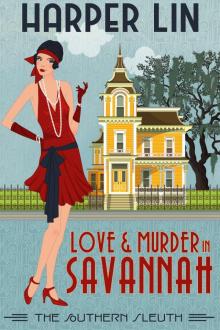 Love and Murder in Savannah
Love and Murder in Savannah Cremas, Christmas Cookies, and Crooks
Cremas, Christmas Cookies, and Crooks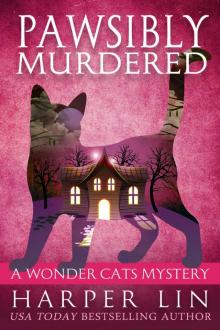 Pawsibly Murdered
Pawsibly Murdered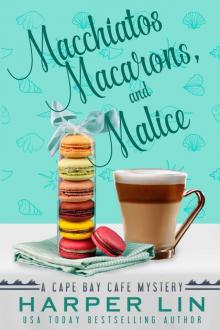 Macchiatos, Macarons, and Malice
Macchiatos, Macarons, and Malice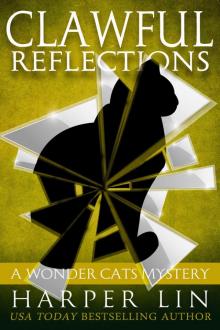 Clawful Reflections
Clawful Reflections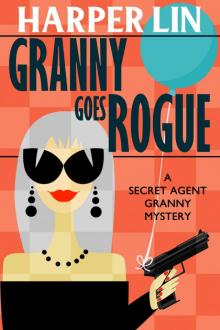 Granny Goes Rogue
Granny Goes Rogue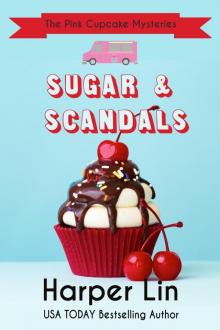 Sugar and Scandals
Sugar and Scandals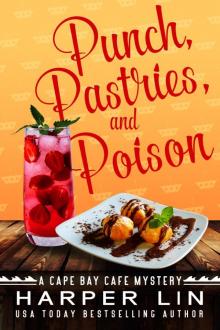 Cape Bay Cafe Mystery 10 - Punch, Pastries, and Poison
Cape Bay Cafe Mystery 10 - Punch, Pastries, and Poison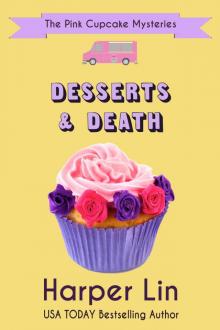 Desserts and Death
Desserts and Death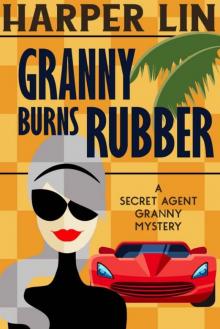 Secret Agent Granny 10 - Granny Burns Rubber
Secret Agent Granny 10 - Granny Burns Rubber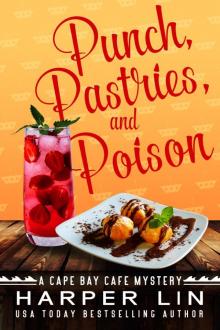 Punch, Pastries, and Poison
Punch, Pastries, and Poison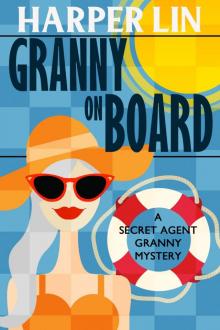 Granny on Board
Granny on Board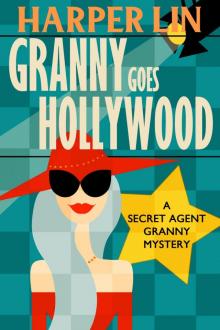 Granny Goes Hollywood
Granny Goes Hollywood Chocolat Chaud Murder
Chocolat Chaud Murder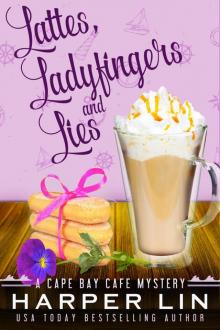 Lattes, Ladyfingers, and Lies
Lattes, Ladyfingers, and Lies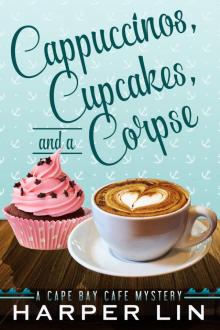 Cappuccinos, Cupcakes, and a Corpse
Cappuccinos, Cupcakes, and a Corpse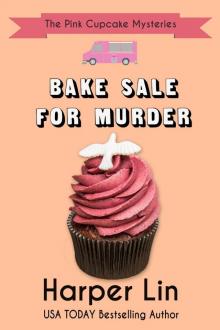 Bake Sale for Murder
Bake Sale for Murder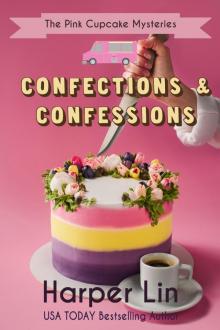 Confections and Confessions
Confections and Confessions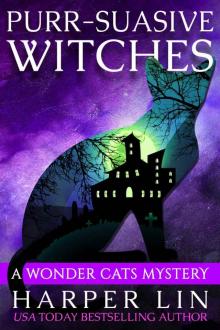 Purr-suasive Witches (A Wonder Cats Mystery Book 11)
Purr-suasive Witches (A Wonder Cats Mystery Book 11)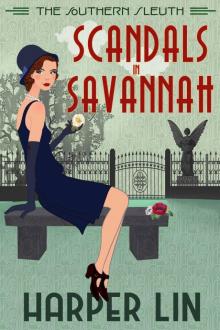 Scandals in Savannah
Scandals in Savannah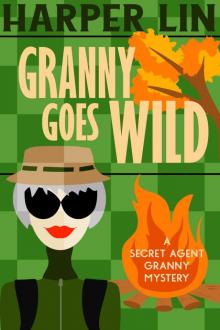 Granny Goes Wild
Granny Goes Wild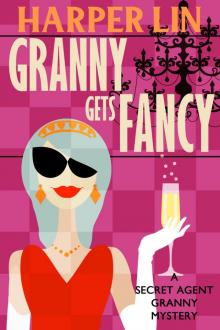 Granny Gets Fancy
Granny Gets Fancy Croissant Murder (A Patisserie Mystery with Recipes)
Croissant Murder (A Patisserie Mystery with Recipes)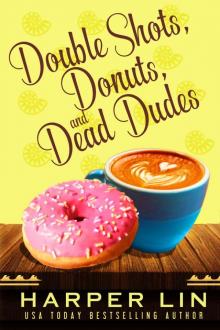 Double Shots, Donuts, and Dead Dudes
Double Shots, Donuts, and Dead Dudes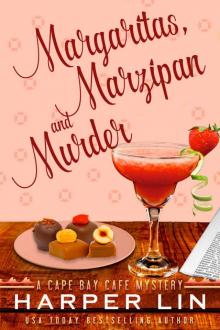 Margaritas, Marzipan, and Murder
Margaritas, Marzipan, and Murder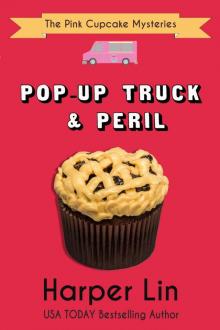 Pop-Up Truck and Peril
Pop-Up Truck and Peril Harper Lin - Patisserie 06 - Crème Brûlée Murder
Harper Lin - Patisserie 06 - Crème Brûlée Murder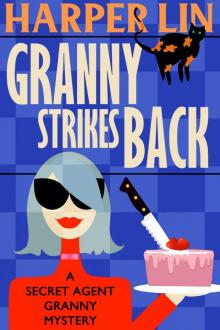 Granny Strikes Back
Granny Strikes Back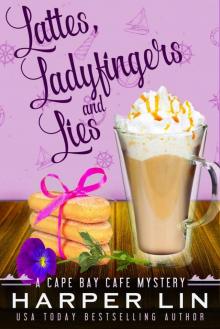 Lattes, Ladyfingers, and Lies (A Cape Bay Cafe Mystery Book 4)
Lattes, Ladyfingers, and Lies (A Cape Bay Cafe Mystery Book 4)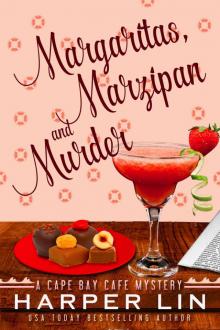 Margaritas, Marzipan, and Murder (Cape Bay Cafe 3)
Margaritas, Marzipan, and Murder (Cape Bay Cafe 3)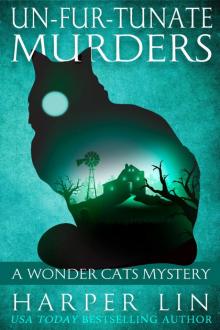 Un-fur-tunate Murders
Un-fur-tunate Murders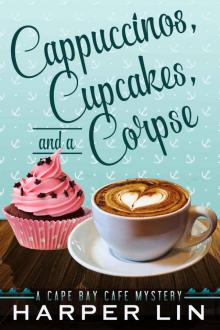 Cappuccinos, Cupcakes, and a Corpse (A Cape Bay Cafe Mystery Book 1)
Cappuccinos, Cupcakes, and a Corpse (A Cape Bay Cafe Mystery Book 1)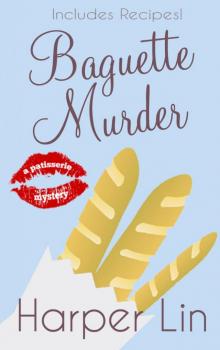 Baguette Murder: Book 3 (A Patisserie Mystery with Recipes)
Baguette Murder: Book 3 (A Patisserie Mystery with Recipes) 03 Food Festival and a Funeral
03 Food Festival and a Funeral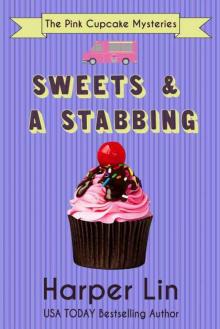 Sweets and a Stabbing (The Pink Cupcake Mysteries Book 1)
Sweets and a Stabbing (The Pink Cupcake Mysteries Book 1) A Deadly Bridal Shower (The Pink Cupcake Mysteries Book 2)
A Deadly Bridal Shower (The Pink Cupcake Mysteries Book 2)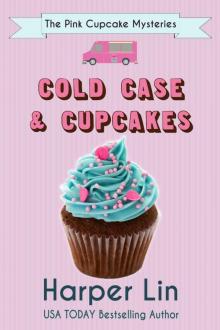 04 Cold Case and Cupcakes
04 Cold Case and Cupcakes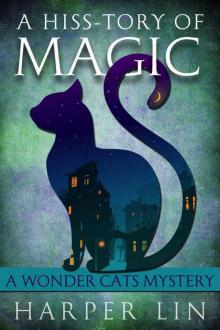 1 A Hiss-tory of Magic
1 A Hiss-tory of Magic 2 Éclair Murder
2 Éclair Murder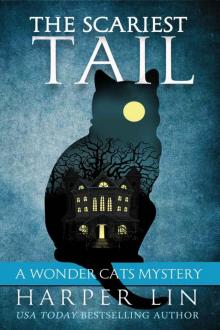 The Scariest Tail (A Wonder Cats Mystery Book 4)
The Scariest Tail (A Wonder Cats Mystery Book 4)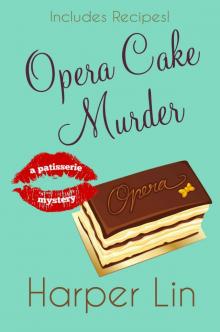 Opera Cake Murder (A Patisserie Mystery with Recipes Book 8)
Opera Cake Murder (A Patisserie Mystery with Recipes Book 8)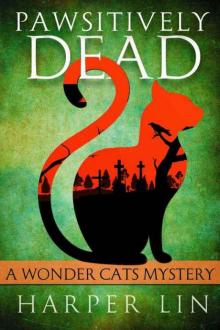 Pawsitively Dead (A Wonder Cats Mystery Book 2)
Pawsitively Dead (A Wonder Cats Mystery Book 2)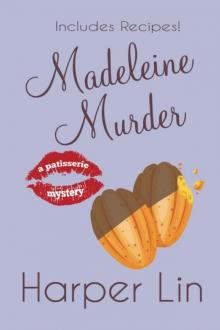 Harper Lin - Patisserie 07 - Madeleine Murder
Harper Lin - Patisserie 07 - Madeleine Murder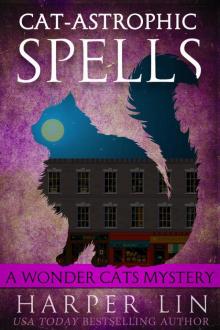 Cat-astrophic Spells
Cat-astrophic Spells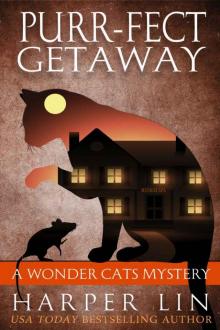 Purr-fect Getaway (A Wonder Cats Mystery Book 5)
Purr-fect Getaway (A Wonder Cats Mystery Book 5)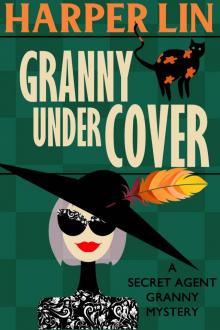 Granny Undercover (Secret Agent Granny Book 2)
Granny Undercover (Secret Agent Granny Book 2)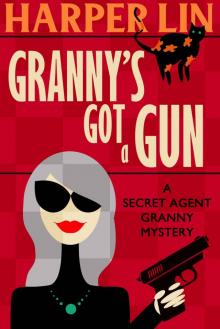 Granny's Got a Gun (Secret Agent Granny Book 1)
Granny's Got a Gun (Secret Agent Granny Book 1)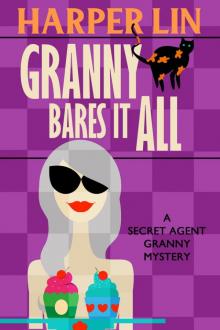 Granny Bares It All
Granny Bares It All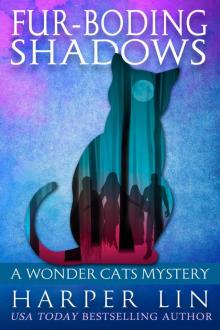 Fur-boding Shadows
Fur-boding Shadows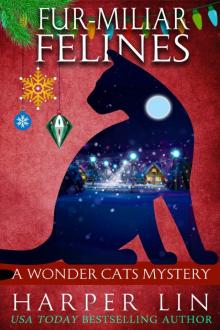 Fur-miliar Felines
Fur-miliar Felines